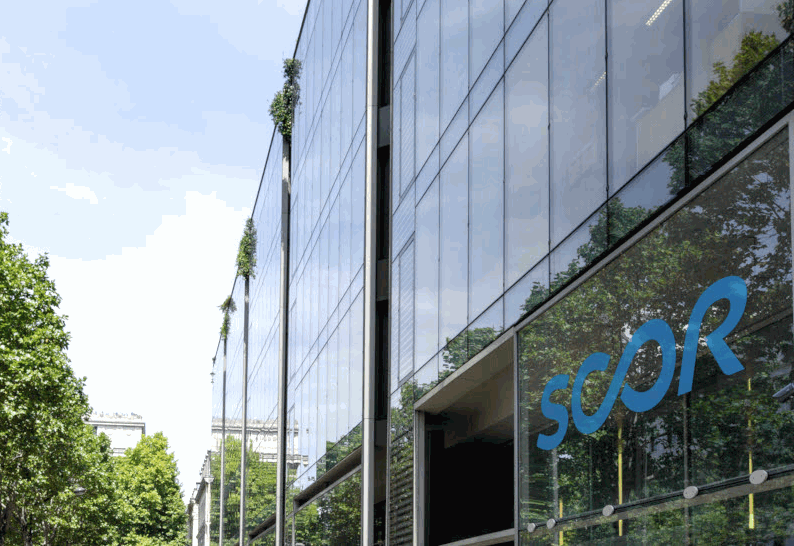SCOR falls to Q1 loss on Cats, COVID & Ukraine. Strong growth continues

Global reinsurance firm SCOR has reported a loss for the first-quarter of 2022, as claims from natural catastrophes and mortality related to the COVID-19 pandemic, as well as reserving for losses from the conflict in Ukraine, all dented its performance.
SCOR reported a net loss of EUR 80 million for Q1 2022, down from a profit of EUR 45 million a year earlier.
The natural catastrophe budget came out at 10.1%, above SCOR’s 8% budget for the quarter, on the back of losses from events around the world including the flooding in Australia, storms in Europe and earthquake in Japan.
In addition to natural catastrophe losses, SCOR’s attritional ratio was also high in its P&C reinsurance division, driven by reserving EUR 85 million for potential losses caused by Russia’s war in Ukraine and also drought in Brazil, which together drove an elevated loss ratio of 74.4% and a combined ratio of 103.7% for the P&C business.
Slightly offsetting this was higher claims ceded to retrocessionaires, of EUR 145 million for Q1 2022, up from EUR 85 million a year earlier.
On the life and health reinsurance side, EUR 195 million of COVID-19 related mortality impacts, after retrocession, dented the result, but in total SCOR ceded EUR 441 million of its life and health claims in the period, demonstrating the importance of its retro arrangements in moderating the impacts of the pandemic on its business.
SCOR continued to grow its reinsurance and insurance books strongly during the first-quarter, reporting 9.7% increase in gross premiums underwritten to EUR 4.175 billion.
Growth in property and casualty reinsurance was particularly strong, with GWP up 20.2% amid strong renewals in reinsurance and specialty lines business.
Also, at the April reinsurance renewals, SCOR expanded its portfolio by 19.6% while securing an overall price increase of 4.5% on treaty reinsurance renewed year to date, the company said today.
But, while some of its competitors are expanding heavily into natural catastrophe risks, SCOR said it is now on-track for a reduction in its catastrophe PML of 15% year-on-year by the end of 2022.
That reduction in catastrophe exposure is coming both by judicious reductions in some areas, as well as ongoing growth into diversifying areas of its business.
SCOR believes it can reduce volatility in its results this way, while also lowering its exposure to climate change.
Summing up this strategy as, “selectively focusing its growth on profitable lines, while proactively optimizing its retrocession strategy and working on other de-risking initiatives”
At the April reinsurance renewals SCOR said it repositioned its portfolio further away from property catastrophe risks in the US and undertook disciplined growth in Japanese cat risks instead.
The company said it expects to take additional actions of this kind in June and July, including a further pull-back on US catastrophe risks if market conditions fail to improve sufficiently.
Denis Kessler, Chairman of SCOR, commented on the results “Uncertainties and instabilities are multiplying: the pandemic is ongoing, global refragmentation is accelerating, inflation is back, economic growth is slowing down and the world is being hit by natural catastrophes… Our environment seems increasingly stochastic and random, and global predictability seems to be shrinking.
“Indeed, the (re)insurance industry appears to be facing increasingly frequent shocks and multifaceted and widespread threats. In this respect, we are living in a time of ‘great change’.
“In this environment of major transformation, where risks are multiplying, reinsurance is increasingly necessary to provide security to all economic agents. To accomplish their fundamental mission, reinsurers need to transform themselves and adapt all aspects of their risk management policies. As ultimate risk carriers, their Solvency is critically important. SCOR is ready to meet all these challenges, building on its franchise, its recognized technical expertise, the talent of its teams and its command of new technology. I am convinced that SCOR, with its proven good governance and proactive management, will steadfastly pursue the best ways and means to enable the Group to continue its value creating journey.”
Laurent Rousseau, Chief Executive Officer of SCOR, added, “Q1 2022 has been marked by a series of exceptional events both in L&H and in P&C, which have negatively impacted our financial performance. Amongst these, we have been especially focused on managing the impact of the conflict in Ukraine – from a financial, operational and human standpoint.
“We are also continuously focused on our main objectives: reducing volatility, increasing profitability, growing the franchise, optimally allocating capital and embarking on the transformation of the Group. Our January 1 and April 1 P&C treaty reinsurance renewals have been strong, and we have a clear action plan in place across the entire organization to improve the Group’s financial performance in 2022. Despite an accounting loss, SCOR’s solvency position remains robust, with a solvency ratio of 240%.”





